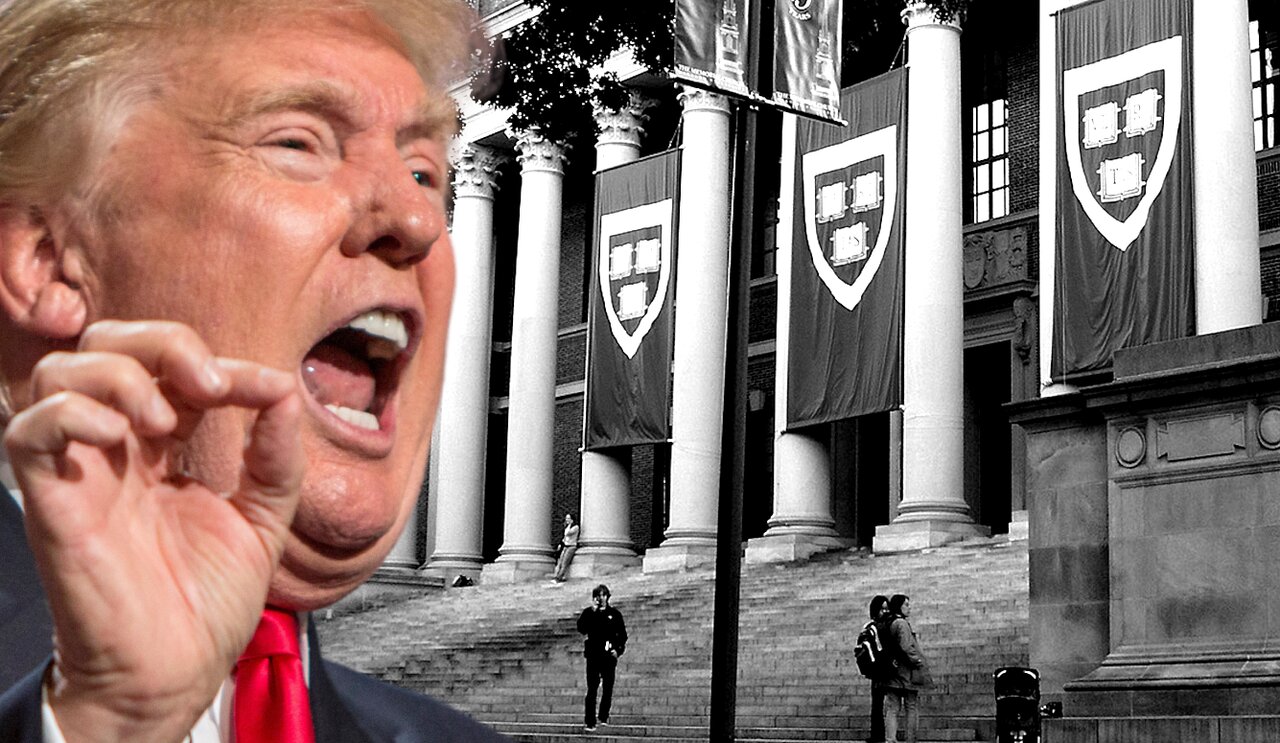Trump’s war on Harvard
Trump targets academic freedom, civil discourse and viewpoint diversity

TEHRAN - Since the beginning of his second term, President Trump has stepped up his war against elite American universities, claiming that they foster antisemitism and leaning toward certain ideologies.
His administration has warned it will use its authority to slash or freeze billions in federal funding to institutions like Columbia, Northwestern, Cornell and Harvard if they don’t overturn what it claims as anti-Israel and antisemitism-friendly diversity or admissions policies, and limit their academic freedom.
This broader effort aims to exert political control over higher education through executive orders and regulatory pressure.
Against this backdrop, Homeland Security Secretary Kristi Noem’s recent revocation of Harvard’s certification to enroll international students marks a sharp escalation.
This unprecedented action forces nearly 7,000 foreign students to transfer or risk losing their legal status, weaponizing immigration policy against Harvard in response to the university’s dissent from government policy. The action underscores the administration’s willingness to use federal power to suppress dissent, control political expression and compel ideological uniformity in higher education, for which it would set a dangerous precedent, jeopardizing the free exchange of ideas at American colleges and universities.
The crackdown: What happened?
The Department of Homeland Security (DHS) has revoked Harvard University’s certification under the Student and Exchange Visitor Program (SEVP), which authorizes U.S. colleges to enroll international students and issue visa documentation. This revocation means Harvard can no longer admit new international students, and approximately 6,800 currently enrolled—27% of its student body—must transfer to other certified institutions or risk losing their legal status in the U.S.
The administration justified this unprecedented action by accusing Harvard of fostering an unsafe campus environment marked by violence, antisemitism, and collaboration with the Chinese Communist Party.
Secretary Kristi Noem stated that Harvard had ample opportunity to comply with demands for extensive student records, including disciplinary files and surveillance data on protests, but refused. She framed international student enrollment as a “privilege,” alleging Harvard exploited these students for tuition and endowment gains.
Harvard’s response: Unlawful and retaliatory
Harvard swiftly condemned the decision as unlawful and retaliatory, emphasizing its commitment to supporting international students and scholars from over 140 countries who enrich both the university and the nation. University spokesperson Jason Newton described the move as “a serious threat to the Harvard community and our nation,” undermining the university’s academic and research missions.
The administration has already been sued by the university for other punitive actions, such as attempting to change its admissions, hiring, and curriculum policies. As Harvard battles to regain its ability to admit international students, this most recent action is anticipated to spark additional legal challenges.
Politically motivated attack on academic freedom
The crackdown is not an isolated incident but part of a broader pattern of political retaliation by the Trump administration against Harvard, which has been a visible institutional target due to its refusal to bow to demands to censor protests against Israel’s war on Gaza, eliminate diversity, equity, and inclusion (DEI) initiatives, and submit to intrusive government oversight.
The administration’s allegations of antisemitism and “racist” DEI policies appear to be a pretext to justify a punitive campaign aimed at controlling the university’s autonomy and ideological direction.
The administration's use of immigration law and regulatory power as a weapon is compromising academic freedom, which is the fundamental right of universities to self-govern and promote an open, diverse, and politically free exchange of ideas.
Legal and political fallout
The Trump administration’s revocation of Harvard’s certification under the SEVP sends a chilling warning to universities nationwide: failure to comply with politically motivated government demands may lead to severe consequences.
Legally, the administration’s authority is constrained by due process and administrative law, and courts have recently blocked similar executive overreach. Harvard has condemned the revocation as unlawful and plans to challenge it in court. Politically, the move weaponizes immigration enforcement to impose ideological conformity, deepening polarization, and threatening democratic norms and academic independence.
Threat to higher education’s global standing
Broader implications for U.S. higher education are severe. The crackdown risks deterring international students, who are vital to intellectual diversity, innovation, and America’s global competitiveness in science, technology, and culture.
This politicization of immigration and education policies disrupts thousands of lives and damages the reputation of U.S. universities worldwide.
The international student body at Harvard is crucial to promoting innovation and academic excellence. The administration's punitive measures are a risky overreach that threatens democratic principles and educational autonomy.
The fight to preserve Harvard is not just about defending the university; it is also about defending academic freedom and the United States' position as a beacon.
Leave a Comment